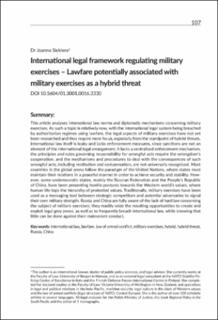| dc.contributor.author | Siekiera, Joanna | |
| dc.date.accessioned | 2023-06-07T12:05:48Z | |
| dc.date.available | 2023-06-07T12:05:48Z | |
| dc.date.created | 2023-05-30T19:20:04Z | |
| dc.date.issued | 2023 | |
| dc.identifier.issn | 2720-5460 | |
| dc.identifier.uri | https://hdl.handle.net/11250/3070368 | |
| dc.description.abstract | This article analyses international law norms and diplomatic mechanisms concerning military exercises. As such a topic is relatively new, with the international legal system being breached by authoritarian regimes using lawfare, the legal aspects of military exercises have not yet been researched and thus require more focus, especially from the standpoint of hybrid threats. International law itself is leaky and lacks enforcement measures, since sanctions are not an element of the international legal arrangement. It lacks a centralised enforcement mechanism, the principles and rules governing responsibility for wrongful acts require the wrongdoer’s cooperation, and the mechanisms and procedures to deal with the consequences of such wrongful acts, including restitution and compensation, are not universally recognised. Most countries in the global arena follow the paradigm of the United Nations, where states must maintain their relations in a peaceful manner in order to achieve security and stability. However, some undemocratic states, mainly the Russian Federation and the People’s Republic of China, have been presenting hostile postures towards the Western world’s values, where human life tops the hierarchy of protected values. Traditionally, military exercises have been used as a messaging tool between strategic competitors and potential adversaries to signal their own military strength. Russia and China are fully aware of the lack of hard law concerning the subject of military exercises; they readily seize the resulting opportunities to create and exploit legal grey zones, as well as to frequently breach international law, while knowing that little can be done against their malevolent conduct. | en_US |
| dc.language.iso | eng | en_US |
| dc.publisher | Ministry of Justice, Poland | en_US |
| dc.rights | Navngivelse-Ikkekommersiell 4.0 Internasjonal | * |
| dc.rights.uri | http://creativecommons.org/licenses/by-nc/4.0/deed.no | * |
| dc.title | International legal framework regulating military exercises – Lawfare potentially associated with military exercises as a hybrid threat | en_US |
| dc.type | Journal article | en_US |
| dc.description.version | publishedVersion | en_US |
| cristin.ispublished | true | |
| cristin.fulltext | original | |
| dc.identifier.doi | 10.5604/01.3001.0016.3330 | |
| dc.identifier.cristin | 2150300 | |
| dc.source.journal | International Law Quarterly | en_US |
| dc.source.pagenumber | 107-125 | en_US |
| dc.identifier.citation | International Law Quarterly. 2023, 1 (1), 107-125. | en_US |
| dc.source.volume | 1 | en_US |
| dc.source.issue | 1 | en_US |

